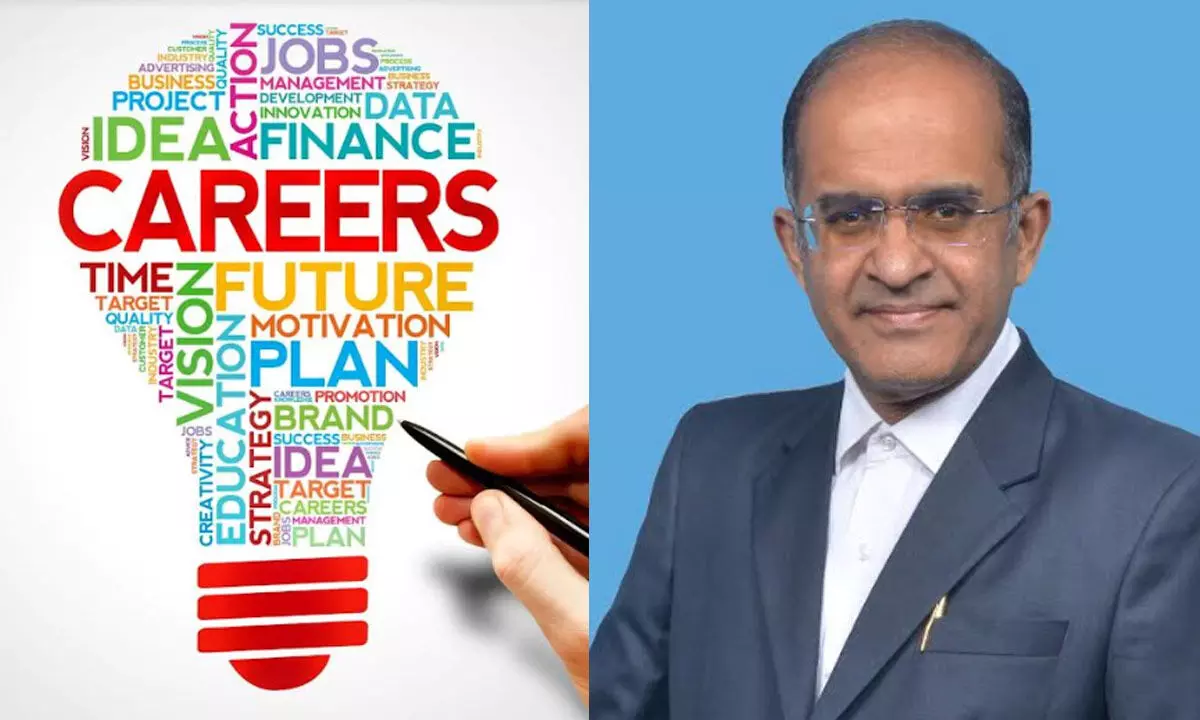The Driver's Seat: How You Shape Your Own Future

You are responsible for your future. What you do today creates your tomorrow.
"Your future is your responsibility, shaped by the actions you take today. Every decision you make influences your mindset, communication, and behaviour, ultimately laying the foundation for your future career success. So, where do you begin this journey? This article guides you in defining your career vision, suggests strategies for honing new skills, and provides valuable tips to help you stay on the path toward your goals."
"Unlocking Your Potential: The Path to Lifelong Learning and Career Success"
In today's rapidly evolving world, staying ahead of the curve is essential for personal and professional growth. The keys to achieving this lie in cultivating a lifelong-learning mindset, discovering the right career path, learning from experience, accepting, and acting on feedback, and optimizing formal learning opportunities. This article delves into these five main points, offering practical advice and actionable strategies to help you navigate the journey towards continuous improvement and success.
1. Establish Your Lifelong-Learning Mindset
In a world where change is constant, cultivating a lifelong-learning mindset is crucial. Here are some key steps to get started:
Set goals and track them: Begin by defining your learning goals. Whether it is acquiring a new skill, expanding your knowledge, or enhancing your career prospects, setting clear objectives will keep you focused.
Create a plan: Once you have your goals in mind, create a learning plan. Break down your objectives into manageable steps to make your learning journey more structured and achievable.
Schedule time to learn: Make learning a part of your daily routine. Dedicate time for it in your schedule, and stick to it. Consistency is the key to lifelong learning.
Incorporate experiential learning: Learning is not limited to textbooks and classrooms. Actively engage in experiences that challenge you and provide valuable insights. This type of learning can be both enjoyable and eye-opening.
Reflect on what you are learning: Regularly reflect on your progress. Ask yourself what you have learned and how it can be applied to your life and career. Self-reflection enhances comprehension and retention.
Balance your life and include rest and fun: A balanced life is essential for effective learning. Make sure to include time for relaxation and enjoyment. Overloading yourself can lead to burnout, hindering your learning journey.
2. Find the Right Career Path
Choosing the right career path is a vital step towards personal and professional fulfilment. Here is how to navigate this crucial decision:
Learn what you need to learn: Before making a career choice, thoroughly research the field you are interested in. Understand the skills and knowledge required for success in that industry.
Connect with others: Networking is invaluable in any field. Regardless of the type, be open to connecting with people who can provide guidance and opportunities.
Networking works: Networking can open doors to opportunities you might not have otherwise discovered. Attend industry events, join professional organizations, and connect on social media platforms to expand your network.
Accept opportunities:Do not be afraid to accept opportunities that come your way, even if they seem challenging. These experiences can lead to significant growth and provide insights into your true passions.
Expand beyond:Do not limit yourself to a single career path. Explore diverse opportunities and be open to trying new things. You might discover interests and talents you didn't know you had.
Keep learning: Continuous learning is crucial for career growth. Stay up-to-date with industry trends and advancements to remain competitive and relevant in your chosen field.
3. Learn from Experience
Learning from your experiences, both positive and challenging, is a powerful tool for self-improvement. Here is how to make the most of your life experiences:
Review past experiences: Take the time to reflect on your past experiences. Consider what you have learned, both in terms of skills and personal growth.
Find your passion: Identify your true passions and interests. Understanding what drives you will help you make informed decisions about your life and career.
Learn from discomfort: Sometimes, the most significant growth occurs when you step out of your comfort zone. Embrace discomfort as an opportunity to learn and develop new skills.
Determine your risk level: Assess your risk tolerance. Understanding how comfortable you are with taking risks can help you make informed decisions about your career and life choices.
Find the “so what”: When discussing your experiences, always seek the "so what" or the significance of what you have learned. This approach will help you extract valuable insights from your life journey.
4. Accept and Act on Feedback
Receiving feedback can be a transformative experience when handled correctly. Here is how to effectively embrace feedback for personal and professionalprofessionalprofessional growth:
Open-Minded Reception: Be open to feedback, whether it is praise or constructive criticism. An open-minded approach allows you to see different perspectives and improve.
Reflect and Analyse: Take time to reflect on the feedback you receive. Analyse its validity and relevance to your goals or performance. Use this analysis to inform your next steps.
Actionable Insights: Identify specific actions or changes that can be made based on the feedback. Turn feedback into a plan for improvement and growth.
Seek Clarification: If the feedback is unclear or requires more context, don't hesitate to seek clarification from the source. This ensures you fully understand the feedback's intent and implications.
Continuous Improvement: View feedback as a tool for continuous improvement. Use it as a means to grow, adapt, and enhance your skills, performance, and relationships.
5. Optimize Formal Learning Opportunities
Formal learning opportunities, such as courses and educational programs, are essential for skill development and career advancement. Here is how to make the most of them:
Prepare: Before enrolling in any formal learning program, make sure you are prepared to fully commit to it. Assess your readiness, both in terms of time and resources.
Learn to: Take a strategic approach to learning. Set specific learning objectives and milestones, and track your progress as you go through the program.
Connect it: Connect what you learn to your existing knowledge and experiences. This integration enhances comprehension and retention of new information.
Get motivated: Stay motivated throughout the learning process by setting incentives or rewards for reaching specific milestones. Keeping your motivation high is essential for successful learning.
Get a referral: Consider seeking recommendations or referrals from individuals who have already taken the program you are interested in. Hearing about their experiences can help you make informed choices.
In conclusion, embracing a lifelong-learning mindset, choosing the right career path, learning from experience, accepting, and acting on feedback, and optimizing formal learning opportunities are key components of personal and professional growth. By following these steps and strategies, you can unlock your potential, seize new opportunities, and achieve the success you desire. Remember, your journey towards continuous improvement and success is in your hands, and it begins with a commitment to lifelong learning.
The author is a Professor - Media & Communication, School of Media Studies, Presidency University- Bangalore









